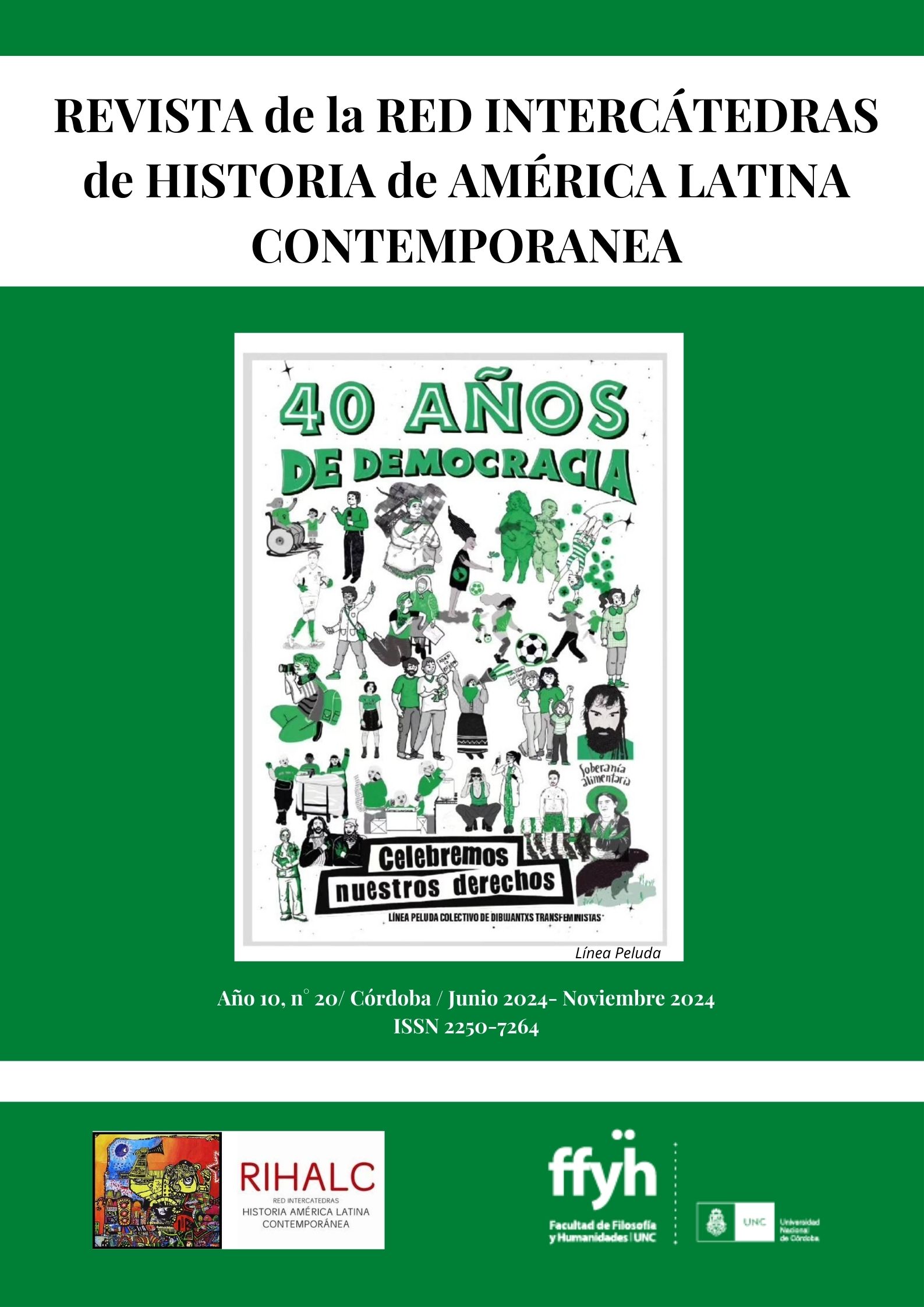2002, coup to Chávez: the opposition articulation and the "rebellion of the receiver". A re-reading based on hegemony
Keywords:
Coup d'Etat, Hugo Chávez, Hegemony, Discourse, ArticulationAbstract
Framed within a larger project that includes the study of the political and discursive articulation in the dispute for hegemony carried out by Chavismo, this paper seeks to reread the events of the coup d'état of April 11, 2002 against Hugo Chávez based on two linked questions: what characteristics did the opposition articulation that orchestrated the coup acquire and, fundamentally, why it did not succeed in imposing itself. To this end, we reconstruct the causes of support to the coup from each sector as well as the actions and discursive articulations carried out by the opposition in the "insurrectional period" with primary and secondary sources, and we analyze why, in spite of having not only the support of businessmen, unions and external support, but also a communicational monopoly articulated against Chávez, it did not manage to successfully question the popular majorities and turn them against him. The use of a theoretical framework from (based on) notions such as the "rebellion of the receiver" and the "nuclei of good sense" help to understand the forms of this resistance, integrating structural and superstructural aspects, in order to elucidate the reason for the popular mobilization and the consequent failure of the coup d'état.
References
Álvarez, Víctor (2013): “El legado de Chávez en materia petrolera”, en Luis Bonilla, El Legado de Chávez, Centro Internacional Miranda, Caracas, pp. 31-45.
Aveledo, Guillermo (2012): “La Iglesia Católica venezolana frente a la revolución bolivariana, 1999-2010”, Cuadernos Unimetanos, N° 30, pp. 39-53.
Balsa, Javier (2006): “Las tres lógicas de la construcción de la hegemonía”, Revista Theomai N° 14, pp. 16-33.
Balsa, Javier y Liaudat, María (2020): “La investigación del consenso en las luchas por la hegemonía: una propuesta metodológica y su ejemplificación en el agro pampeano actual”, Revista Latinoamericana de Metodología de las Ciencias Sociales, Vol. 10, N° 2, pp. 1-16.
Barbero, Jesús (1987): De los medios a las mediaciones, Ed. G. Gili, Ciudad de México.
Bello, Luis (2005): Derechos de los pueblos indígenas en el nuevo ordenamiento jurídico venezolano, Ed. del autor, Caracas.
Berengan, Mauro (2023): “Venezuela 1992-1994, Chávez y los comandantes en Yare: rearticulaciones políticas e ideológicas tras el 4F”, Sudamérica, Revista de Ciencias Sociales, N° 19, pp. 214-242.
Berengan, Mauro (2022a): “20 años del golpe contra Hugo Chávez: identidad política, pertenencia de clase, y lucha por la hegemonía”, Revista ContrehegemoníaWeb. Disponible en: https://contrahegemoniaweb.com.ar/2022/04/11/20-anos-del-golpe-contra-hugo-chavez-identidad-politica-pertenencia-de-clase-y-lucha-por-la-hegemonia/
Berengan, Mauro (2022b): “El Polo Patriótico y la fuerza del mito: articulación política e ideológica en las elecciones venezolanas de 1998”, Revista Izquierdas N° 51, pp. 1-21.
Bartly, Kim y O’Brian, Donnacha (2003): La revolución no será televisada [Película]. Vitagraph Films, Caracas.
Biord Castillo, Horacio (2013): “De la negación a la reafirmación: polarización, diversidad social y entendimientos en Venezuela”, Revista venezolana de economía y ciencias sociales N° 19, pp. 171-195.
Bonilla, Luis y El Troudi, Haiman (2004): Historia de la revolución bolivariana, Ministerio de Comunicación e Información, Caracas.
Borón, Atilio (2012): América Latina en la geopolítica del imperialismo, Ed. Luxemburg, Buenos Aires.
Britto García, Luis (2012): Dictadura mediática en Venezuela, Correo del Orinoco, Caracas.
Bruckmann, Mónica (2011): Recursos naturales y la geopolítica de la integración sudamericana. Edición digital sin datos de libre acceso. Disponible en: https://cronicon.net/paginas/Documentos/Libro-Bruckmann.pdf
Ciccariello Maher, George (2017): Nosotros creamos a Chávez, El perro y la rana, Caracas.
Denis, Roland (2001): Los fabricantes de la rebelión, Ed. Primera Línea, Caracas.
Ellner, Steve (2004): “Tendencias recientes en el movimiento laboral venezolano. Autonomía vs control político”. Revista Venezolana de Economía y Ciencias Sociales, V. 9, N° 3, pp. 157-178.
El Nacional (2002): “CTV amenaza con paro de 48hs”, Caracas, 08 de abril. Última página.
El País (2002): “El general que presidía la petrolera pública venezolana abandona a Chávez”, Caracas, 22 de febrero. Disponible en: https://elpais.com/internacional/2002/02/22/actualidad/1014332404_850215.html
Garcés, Joan (2013): Allende y la experiencia chilena, Siglo XXI, Madrid.
Golinger, Eva (2005): El código Chávez, Ed. Monte Ávila, Caracas.
González Oquendo, Luis (2003): “La meritocracia en Pdvsa: la lógica subyacente de una discusión interesada”, Revista venezolana de Ciencias Políticas N° 24, pp. 78-92.
Lander, Luis y López Maya, Margarita (2002): “Venezuela, golpe y petróleo”, Revista OSAL N° 7, pp. 15-18.
López Maya, Margarita (2009): Venezuela, el gobierno de Hugo Chávez y sus fuerzas bolivarianas, Editorial del Instituto Nacional Electoral. Caracas.
López Maya, Margarita (2006): Del viernes negro al 2005 referendo revocatorio, Alfadil, Caracas.
López, Ociel (2015): Dale más gasolina: chavismo, sifrinismo y burocracia, Fundación Andrés Bello, Caracas.
López Sánchez, Roberto (2012): “El movimiento de trabajadores en la Venezuela bolivariana. Configuración de tendencias: autonomistas contra leninistas”, Espacio abierto N°21, pp. 145-181.
Narvaja de Arnoux, Elvira (2008): El discurso latinoamericanista de Hugo Chávez, Biblos, Buenos Aires.
Palacios, Ángel (2004): Puente Llaguno, claves de una masacre [Película], Panafilms, Caracas.
Raby, Diane (2006): “El liderazgo carismático en los movimientos populares y revolucionarios”, Cuadernos del Cendes V. 23, N° 62, pp. 61-74.
Ramírez Pérez, Gabriela (Comp.) (2017): Los documentos del golpe, Ed. El perro y la rana, Caracas.
Vásquez, Paula (2009): Poder y catástrofe. Venezuela bajo la tragedia de 1999, Santillana, Caracas.
Villegas, Ernesto (2012): Abril, golpe desde adentro, Correos del Orinoco, Caracas.
Vinogradoff, Ludmila (2002): “Chávez inicia la purga de militares disidentes y reprime las protestas”, diario El País. Caracas, 22 de febrero. Disponible en: https://elpais.com/diario/2002/02/23/internacional/1014418805_850215.html
Vinogradoff, Ludmila (2002): “Un contralmirante exige la dimisión de Chávez ‘para evitar que corra sangre’”, diario El País. Caracas, 19 de febrero. Disponible en: https://elpais.com/diario/2002/02/19/internacional/1014073204_850215.html
Downloads
Published
Issue
Section
License

This work is licensed under a Creative Commons Attribution-NonCommercial-NoDerivatives 4.0 International License.
Aquellos autores/as que tengan publicaciones con esta revista, aceptan los términos siguientes:
- Los autores/as conservarán sus derechos de autor y garantizarán a la revista el derecho de primera publicación de su obra, el cuál estará simultáneamente sujeto a la Licencia de reconocimiento de Creative Commons que permite la libre distribución con mención de su(s) creadores, no permite el uso comercial ni las obras derivadas. Los autores, al enviar el artículo, acuerdan publicarlo bajo esta licencia..
- Los autores/as podrán adoptar otros acuerdos de licencia no exclusiva de distribución de la versión de la obra publicada (p. ej.: depositarla en un archivo telemático institucional o publicarla en un volumen monográfico) siempre que se indique la publicación inicial en esta revista.
- Se permite y recomienda a los autores/as difundir su obra a través de Internet (p. ej.: en archivos telemáticos institucionales o en su página web) después del proceso de publicación.



